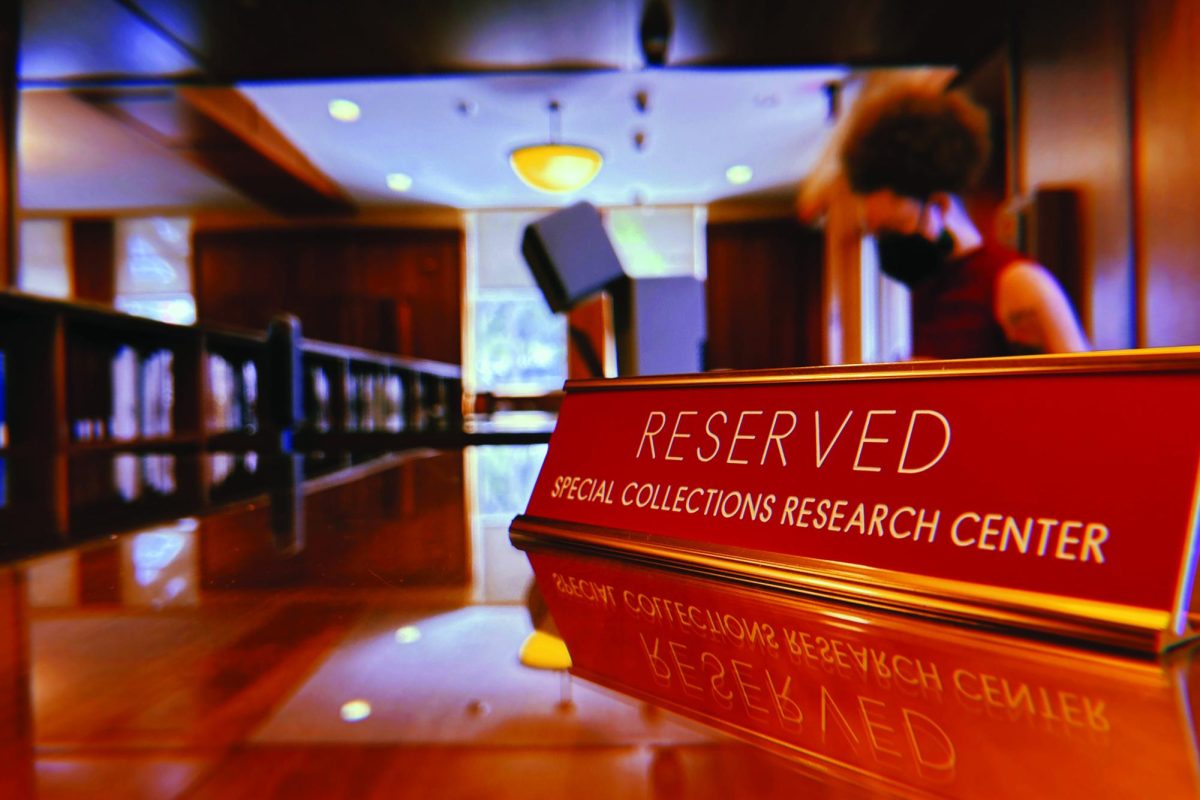Several hundred people gathered at the McKimmon Center Wednesday night for a debate between two scholars about the existence of God. The event, hosted by Campus Crusade for Christ, featured Michael Green, representing the theist perspective, and Douglas Jesseph, a professor in philosophy representing the atheist perspective.
Five hundred additional people were turned away due to lack of space and fire code restrictions. This was the third debate on the existence of God, the first two occurring in Feb. 1996 and 2000.
“You do not prove persons, you meet them,” Green began, stating there is no possibility of proving or disproving the existence of God.
Green then cited evidence in the form of seven signposts: posts of the world, design, personality, values, conscience, religion and Jesus Christ.
He acknowledged the Big Bang theory and said, “Even if the theory of the world were universally accepted among scientists, you would need a starting point for that process.”
He said scientists that credit science for the creation of the world don’t have reasoning for emotions and personality, and that emotions can’t be reduced to chemistry.
Green said that the existence of the conscience and values suggests there is a moral God.
“We all have them but they are hard to understand if there were no God,” he said about values. Green said that there isn’t much basis for value judgments in the matter.
Green said sociologists predicted religion would have died away by the 20th century and that Jesus Christ remains the center of the human race.
“He still remains the unknown God unless he discloses himself,” Green said. “Which he has through life.”
Jesseph began by saying that it was unlikely the audience would be pleased with what he had to say.
“I do claim that the preponderance makes it highly unlikely that there is a God,” he said.
He said that a person who has never questioned God and never weighed all the evidence both for and against a deity’s existence is not an atheist.
Jesseph said he based his argument on rationality, saying there is no good indirect evidence to prove the existence of God.
“There couldn’t be a God if beliefs are guided by reason,” he said, citing his argument for explanatory irrelevance. “If there is a reason to believe in God, his existence must be inferred from observational evidence.”
He then argued history has shown events that were once attributed to Gods, like earthquakes, have been disproved, calling them “supernaturalistic explanations.” Jesseph shot down the design argument, which states the universe was created and fine-tuned by a designer, who Christians believe is God.
“There’s no particular reason to believe there’s a God out there that designed human beings,” he said. “Highly complex structures can arise out of random processes.”
In response to the theist argument that the universe and human life were created for a reason, Jesseph said that because causes are events, God’s decision to create the universe needs a cause.
Jesseph also argued that if there were a God, who is morally perfect as theists believe, it would be aware of the existence of the evils in the world and could not inflict unjustified suffering. He said that if God did create the world, he could have done better.
“Why would God create a world as bad as this?” he said. “There is no conceivable reason why God would not have been motivated to create something even a little bit better.”
Green’s rebuttal focused on why atheism is unconvincing, saying that atheists provide a highly improbable reason for the world’s creation and they rely too heavily on Darwinism.
Green said atheism has lost a high moral ground and that it is not content with being one faith among many. He also said it’s boring and socially ineffective and has failed to articulate a future.
“Atheism is boring, like the old black and white TV,” Green said. “Christianity gives you color TV.”
Jesseph’s rebuttal suggested that the case for theism is in “deep, deep trouble” because it’s a belief followed by people who don’t understand it.
“All this talk about God as a source of values, a source of standards, is irrelevant,” he said.
He said people can be “raging moral absolutionists” without God and that Darwin gives a reasonable explanation for how the university of life was developed.
He said that it’s probable that a person such as Jesus Christ lived and was crucified, but he said it is extremely unlikely that he rose from the dead.
Green said he believes “God is outside the space-time continuum and is able to see the past, present and future continually.” He said his followers do have free will, but that God knows what his followers are going to do.
He also said to think of God as a male who is “totally unbiblical,” and the feminist movement is the proper movement against that.
He ended the debate by saying, “Either this world is a product of divine intelligence…or there are a multitude of universes.”
Jesseph ended by saying, “God…seems to have decided that we’re here to be punished,” and that is inconsistent with the belief that humans have a purpose.
Some felt the number of people that attended and the willingness of both sides to create a dialogue about the issue related to the Bible itself.
“It was unbelievable how many people were trying to hear two sides of an issue,” Brittany Waggoner, a teacher in Raleigh and a graduate student from Regent University, said. “It actually reminded me of stories in the Bible when Jesus was preaching and they had to sometimes pull him away because the crowds were too large.”
Matt Downing, a junior in public relations, said he hoped they hold another debate but in a bigger building.
“I thought they both handled themselves very professionally,” Matt Downing, a junior in public relations, said. “Regardless of who you agreed with it was enlightening to hear the other guy’s thoughts.”
Joseph Walkerkeel, a senior in environmental engineering, said he enjoyed the debate because he liked hearing the questions they presented.
“My point of view doesn’t really reside with either of them,” Walkerkeel said. “I think it’s important to know why you believe what you believe as opposed to just going with the crowd.”
A majority of the people who attended heard of the event through Campus Crusade and other church organizations.
“I came not to find God but because I believe in God,” Waggoner said. “I came to strengthen my own position and to hear what other people had to say.”



